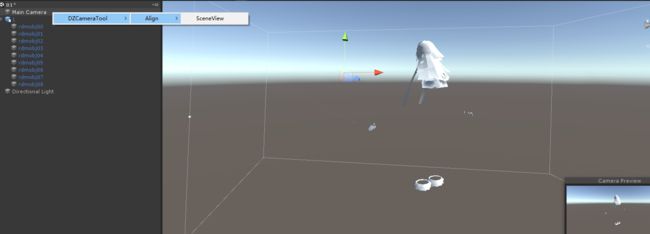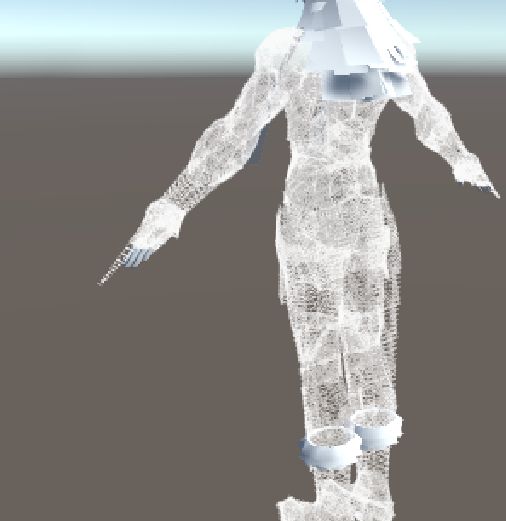@author 小道
发现Unity用来做一些小的渲染实验嗨挺方便。(N年前了,又重新打开试试)
一、Scene视图 ,对齐相机到视图
这个UE是自带了,Unity发现没,就写了,有点丑将就。主要用来后面实验方便点
public class CameraEditor_Tool
{
[MenuItem("DZEditorTool/DZCameraTool/Align/SceneView")]
static void AlignToSceneView()
{
if(Selection.gameObjects.Length >0)
{
Camera viewCame = Selection.gameObjects[0].GetComponent();
if( viewCame != null)
{
Camera cas = UnityEditor.SceneView.lastActiveSceneView.camera;
if(cas == null || cas == viewCame)
return;
Transform camT = cas.transform;
viewCame.gameObject.transform.position = camT.position;
viewCame.gameObject.transform.LookAt(camT.position + camT.forward*10);
}
}
}
[InitializeOnLoadMethod]
static void StartInitializeOnLoadMethod()
{
EditorApplication.hierarchyWindowItemOnGUI += OnHierarchyGUI;
}
static void OnHierarchyGUI(int instanceID, Rect selectionRect)
{
if (Event.current != null && selectionRect.Contains(Event.current.mousePosition)
&& Event.current.button == 1 && Event.current.type <= EventType.MouseUp)
{
GameObject selectedGameObject = EditorUtility.InstanceIDToObject(instanceID) as GameObject;
//这里可以判断selectedGameObject的条件
if (selectedGameObject&&selectedGameObject.GetComponent()!=null)
{
Vector2 mousePosition = Event.current.mousePosition;
EditorUtility.DisplayPopupMenu(new Rect(mousePosition.x, mousePosition.y, 0, 0), "DZEditorTool/",null);
Event.current.Use();
}
}
}
}
二、计算着色器
------Unreal中Shader本身不是很麻烦,主要是按框架写套路麻烦就懒了
原理简单,只是试试本身(该Shader转的,其实很多Shader和算法本身是已经存在,看完改改哦)
Shader "RenderStudio/Geo/Geo_ParticleExp_Beta"
{
Properties
{
//细分相关变量
_Level("Level",int)=0
_DispDir("Displacement Direction",Vector)=(0,0,0)
_uVelScale("VelScale",float)=2
//粒子化特效相关变量
_Speed("Speed",Range(0,1))=1
_ShaderStartTime("Shader Start Time",float)=0
_FinalColor("Final Color",color)=(1,1,1,1)
}
SubShader
{
Tags{"RenderType"="Transparent" "Queue" = "Transparent"}
LOD 100
Pass
{
Blend SrcAlpha OneMinusSrcAlpha // use alpha blending
cull off
CGPROGRAM
#pragma vertex vert
#pragma fragment frag
#pragma geometry geom
#include "UnityCG.cginc"
//CPU输入变量
细分相关变量
uniform int _Level;
uniform float3 _DispDir;
uniform float _uVelScale;
粒子化特效相关变量
uniform float _Speed; //粒子位移速度
uniform float _ShaderStartTime; //粒子化起始时间
uniform fixed4 _FinalColor; //粒子颜色
//内部变量
float3 V0, V1, V2;
float3 CG;
float unityTime;
struct appdata
{
float4 vertex : POSITION;
float3 normal:NORMAL;
};
struct v2g
{
float4 vertex : SV_POSITION;
fixed4 color:COLOR;
float3 normal:NORMAL;
};
struct g2f
{
float4 vertex : SV_POSITION;
fixed4 color:COLOR;
};
v2g vert (appdata v)
{
v2g o;
o.vertex = v.vertex;
o.normal=UnityObjectToWorldNormal(v.normal);
return o;
}
[maxvertexcount(120)]//v2g input[3]
void geom(inout PointStream OutputStream,triangle v2g input[3])
{
float time_SinceBirth=(unityTime-_ShaderStartTime)*0.1f;
g2f o = (g2f)0;
V1 = (input[1].vertex - input[0].vertex).xyz;
V2 = (input[2].vertex - input[0].vertex).xyz;
V0 = input[0].vertex.xyz;
CG=(input[0].vertex.xyz + input[1].vertex.xyz+ input[2].vertex.xyz)/3.0f;
int numLayers =1<<_Level; //2^_Level
float dt = 1.0f / float( numLayers );
float t = 1.0f;
for( int it = 0; it < numLayers; it++ )
{
float smax = 1.0f - t;
int nums = it + 1;
float ds = smax / float( nums - 1 );
float s = 0;
for( int is = 0; is < nums; is++ )
{
float3 v = V0 + s*V1 + t*V2;
float3 vel = _uVelScale * ( v - CG );
v = CG + vel*(_Speed*time_SinceBirth+1.0f) + 0.5f*_DispDir.xyz*sin(it*is)*(_Speed*time_SinceBirth)*(_Speed*time_SinceBirth);
o.vertex = UnityObjectToClipPos(float4( v, 1.0f ));
o.color=_FinalColor;
o.color.w=1.0f-smoothstep(0,1.0f,time_SinceBirth);
OutputStream.Append(o);
s += ds;
}
t -= dt;
}
}
fixed4 frag (g2f i) : SV_Target
{
return i.color;
}
ENDCG
}
}
}

